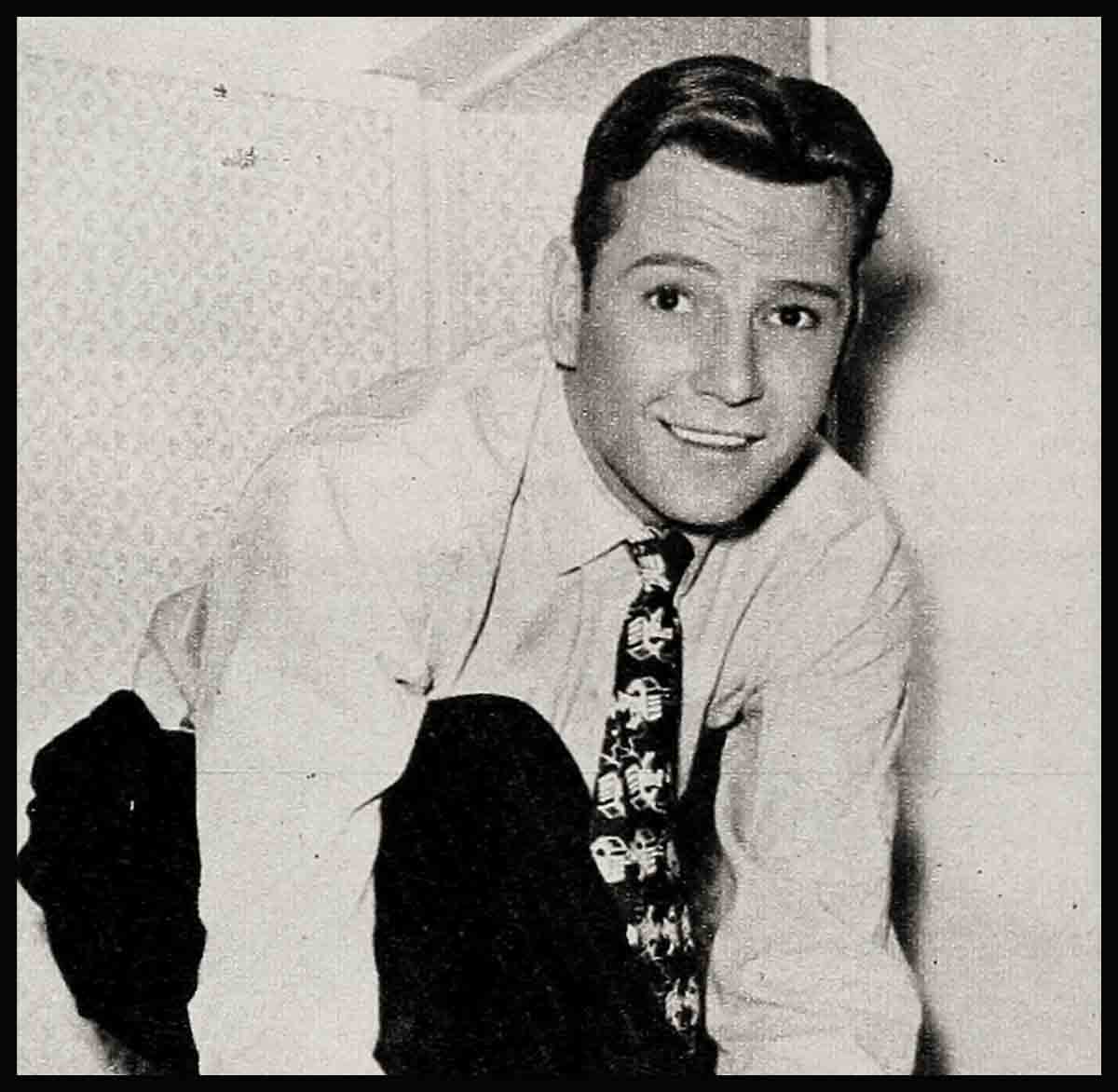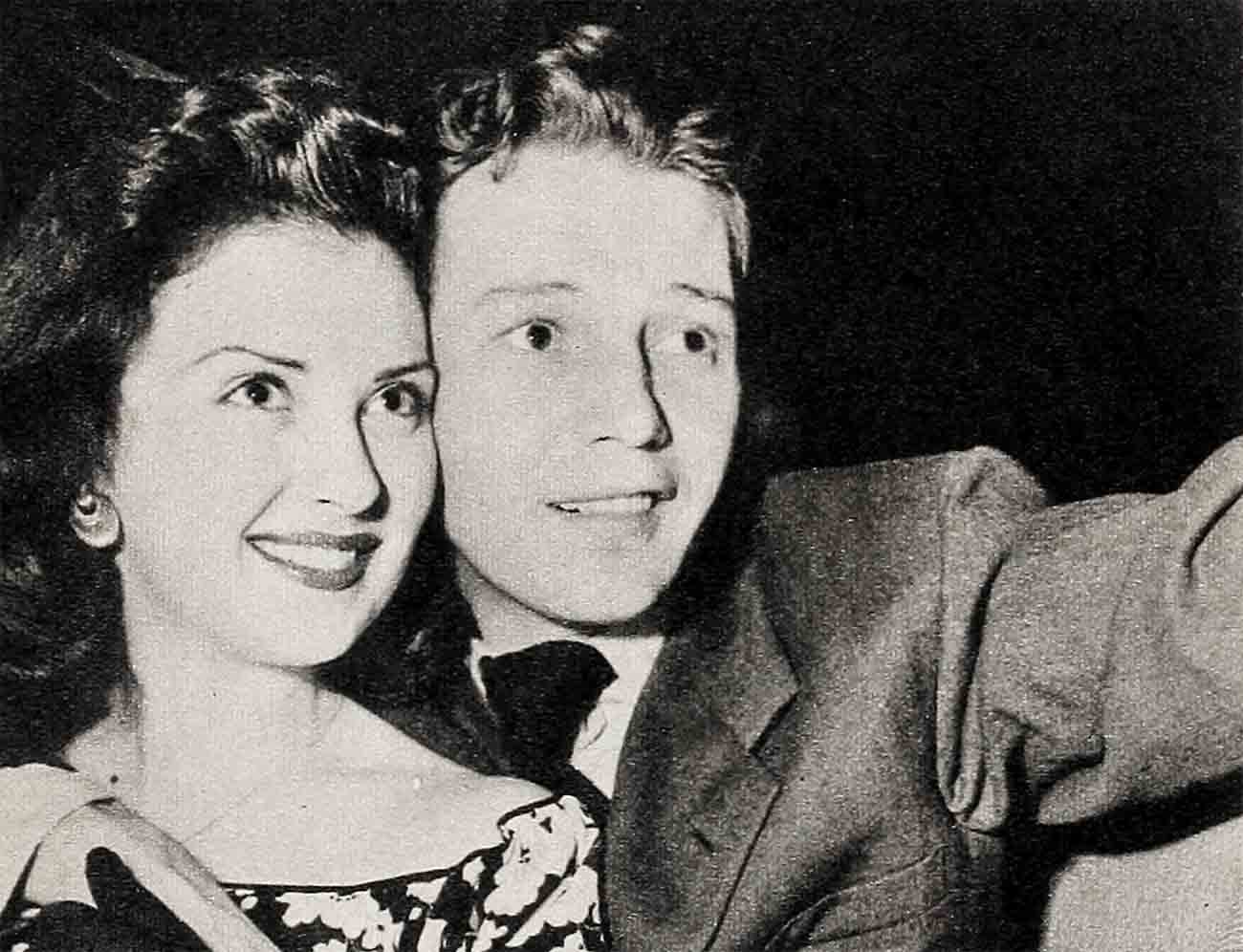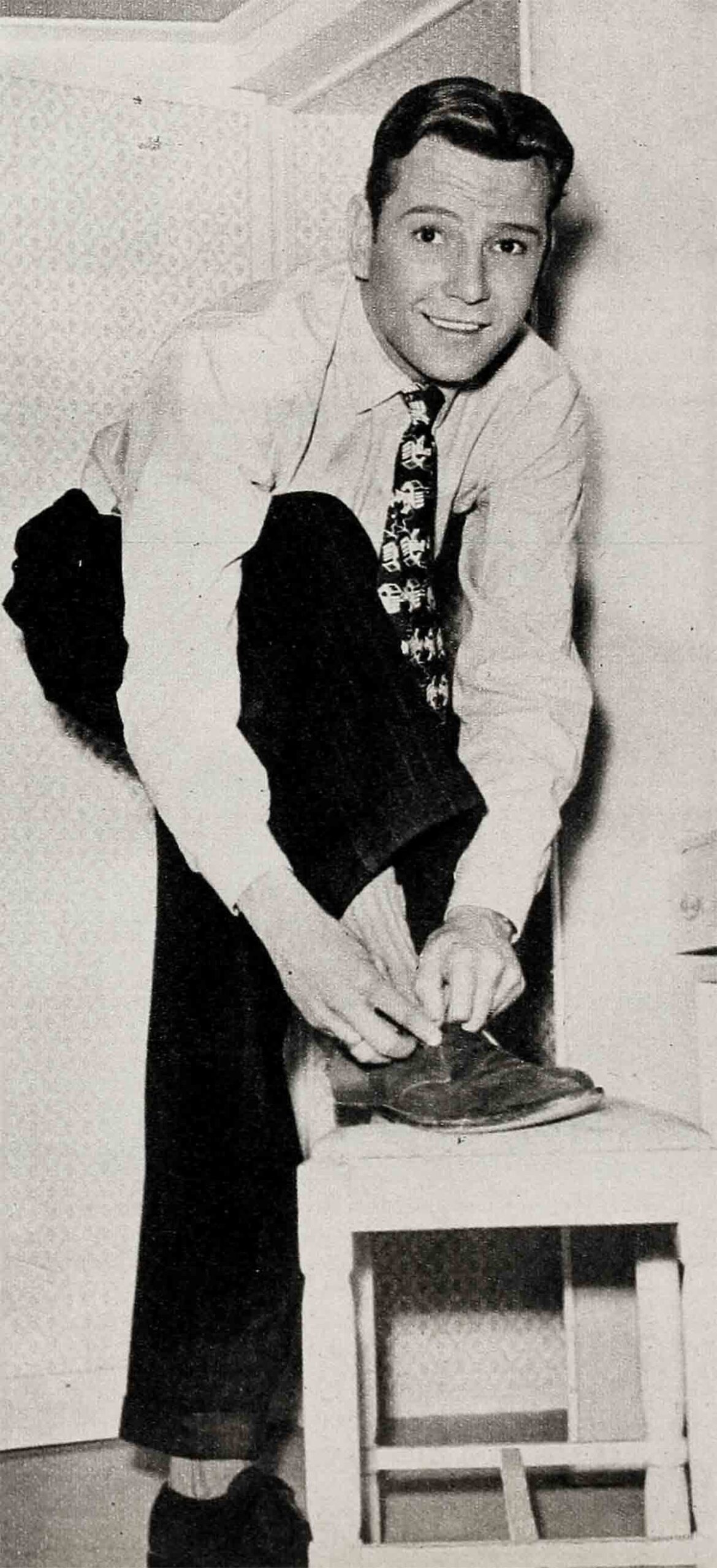
Help Wanted!—Tom Drake
It wasn’t that he needed a new car. It was just that every guy on the lot had a brand new job, and it seemed to Tom Drake that his name had been on the list for a 1947 model since the Paleolithic Age. He couldn’t complain, of course, about owning a 1940 Cadillac, but somehow it didn’t quite stack up against the sleek new numbers that lined Metro’s streets. Van and Pete, almost everybody, had a car that was longer than a John L. Lewis speech. So Tom took his Cadillac down to a body shop.
“Knock off the running boards,” he told the man. “And make the hood look as though it were going somewhere in a hurry. And the back as though it had just left some place.” He paused to survey the car. “Then maybe you could make the windshield slant a little more. You know—give it the business.”
“Gotcha,” said the man.
When the phone call came, at last, that his automobile was ready, he raced to Beverly Hills and tore into the shop. There was his car. Somehow, it had managed to come out looking like a Hupmobile that was trying too hard.
Tom’s life is like that, as full of twists as a pretzel. In the last year, the gremlins assigned to snafu Drake have been concentrating on depriving him of a roof over his head and a pillow under same. Almost anybody likes a home, but Tom likes a home in particular. Not one of the shine-by-night boys, he’s the type that appreciates a favorite chair, a reading lamp, and the peace of mind that goes with belonging somewhere.
There was a house—it seems ages ago to Tom now—in Beverly Hills. But twenty-seven persons, during the space of a year, shared that house with Tom. They were all victims of the housing shortage, and Tom isn’t a guy to say “no” when a friend needs a stopping place. So life, there, was like living in front of a turnstile in a Times Square subway station.
When his lease expired, there was no answer save a hotel. His suitcase was never completely unpacked, and he ate so many restaurant meals that he began to dream of being chased by swarms of evil-looking ulcers who wore menus for hats.
In between hotels, he stayed with friends. But a man can wear out his welcome, so the visits were never too long. His main problem, because he rose so early for work, was to leave places without disturbing the other occupants. He grew so used to tiptoeing that he found himself pussyfooting even in his subsequent hotel rooms.

a room of his own . . .
In most of the homes he had a room to himself, but one friend necessarily had to stow him in the dining-room on a daybed. This was fine with Tom, except that every member of the family was an inveterate ice-box raider. In bed early, Tom would be awakened by one or all of them tiptoeing through the room to reach the kitchen. His only solution was to worry them out of the habit.
“You eat too much,” he told them. “You’re all beginning to look puffy.”
The name of Tom Drake had been resting peacefully and unmolested on the lists of many realtors for months, but finally, after the sixth hotel and the fifth visit as a guest, he was offered an apartment. Immediately, he moved in his clothes and his radio. This radio is his particular pet, a big modern model finished in bleached wood.
The first time he went to the apartment after the moving, the radio was missing. He found it in the closet. He moved it out into the living-room again. The next time he came home the radio was in the closet again. It dawned on him that the landlady, who had meticulously furnished the apartment in Early American style, was displeased by the lines of the instrument. Consequently, the radio commuted daily between the closet and the living-room until, eventually, Tom gave up in disgust and moved himself, and the radio out. He stopped a while with one more friend, and then came his windfall, an apartment that included not only the use of a swimming pool, but a décor that enhanced his radio!
The first day in, Tom went shopping. Drake shopping tours, Christmas or otherwise, are always conducted within the space of one day.
His trouble is remembering everything. It will occur to him, one morning, that he should have a suit pressed, and that he needs a triple socket for the outlet in the bedroom; and that his moccasins need new heel lifts. His shirts are ready at the laundry, he needs some new socks and should buy a birthday gift for one of his nieces.
Under a like set of circumstances, the average person would make a shopping list and get on his horse. Not Drake. When he makes a list, he either forgets to take it with him, or he remembers and then loses it. Anyone can see that what Tom needs most to simplify his life and liquidate his gremlins, is a wife.
At any rate, this particular shopping day was a whiz. He remembered everything. During his home-hopping days, he had lost several suits, so this was remedied by a fitting at the tailor’s, a chore which Tom loathes. The suits ordered, he made a beeline for the ashtray department of a big department store. Dinky ashtrays are Tom’s pet hate, and at the end of a successful day, he returned to his apartment laden with an assortment of ash trays so big that they could be used as fruit bowls, turkey platters or bird baths.
His next thought was of his stomach. The apartment furnished daily maid service, but the fact remained that he longed for home-cooked meals. He employed an excellent cook, a woman named Fanny, whose hours are supposed to be from three o’clock every afternoon until after she has cooked dinner and washed the dishes. Fanny, however, has taken a motherly interest in Tom, and eleven p.m. often finds her hovering over him, trying to talk him into a midnight snack.
It is small wonder that she is captivated. One day she brought her collection of photographs of movie stars, all autographed to her, and proudly displayed them to Tom.
“I’d certainly like a picture of you,” she said.
“Tell you what,” said Tom. “I’ll autograph one for you if you’ll give me one of yourself.”
And the next time Fanny went into Tom’s bedroom, she found her picture, elegantly framed, on his bureau. It stood smack in the center of an array of movie and stage stars, and Fanny was all but overcome with emotion.
In the past year, his career has kept Tom on a merry-go-round and given him few days of rest. With the completion of The Beginning or the End, he went to Washington, D. C., to be present at the world premiére. The most exciting thing that happened to him was riding in a cab down Pennsylvania Avenue and being chased by eight bobby-soxers, all clutching cameras, and seconds.
Back in Hollywood, he went to work in I’ll Be Yours with Deanna Durbin, and then had a brief vacation. Free at last of the rigorous working hours, he went to the fights and the races and dated June Hutton and Beverly Tyler. Just about the time he was remembering what it was like to have fun, he took Bev to Venice Pier, the Coney Island of California.
Their first stop was the baseball-and-milk bottle booth. The first round of baseballs tappled every bottle. Beverly was properly impressed, and Tom handed her the three-cent prize, and asked for another quarter’s worth of balls. These he heaved with such force that a stabbing pain ran down his arm.

carnival casualty . . .
It wasn’t until he and Bev were hurtling around the curves of a roller coaster that he realized something was definitely wrong. It turned out that he had ripped a cartilage in his right arm. To top it off, he overdid a samba that same night and something snapped in his back.
Feeling the worse for wear the next morning, he learned he was to do Alias a Gentleman with Wallace Beery, starting immediately.
“Send over two pairs of your shoes,” the studio told him.
“What for?” Tom wanted to know.
“They have to be built up, for the fight scenes.”
“Fight scenes?” said Tom, running his left hand over his sore arm. He spent the day shadow-boxing, developing a system whereby he jabbed only with his left, and managed to make his right arm look effective while hardly moving it.
One morning, later, he found the shoes in his dressing-room, with heels approximately three inches high. Reaching an exact six feet in height, Tom is taller than average, and it suddenly struck him as strange that they would want him to appear taller. He called the wardrobe department.
“Hey,” he said. “What’s with my shoes? Isn’t six feet tall enough?”
“Six feet!” the man gasped. “Are you six feet?”
“On the button,” said Tom. “I don’t exactly throw barbells around before breakfast, but I ought to be a big enough guy for the part.”
They checked the records, and it turned out that Tom’s stand-in should have been the victim. So Tom sent his shoes back to have the lifts removed.
It’s all too true that Mr. Drake doesn’t tangle with exercise in the mornings. In fact, he tangles with nothing save breakfast, and that, in sort of a half-conscious manner. In school, years ago, he had a roommate who used to wake up briskly on stroke of six, bound out of bed, beat his chest and boom a few arias, all the while jumping about the room as though he were on a pogo stick. The entire ritual was so repugnant to Tom that it colored the rest of his life.
On the set, Tom is in the habit of snatching naps whenever possible, a fact which Wallace Beery discovered with great interest. Beery waited one day until he was sure that Tom was in the arms of Morpheus, then stuffed a smoking rag under the door of Tom’s dressing room. In less than a moment, Tom flung the door open, a handkerchief over his face, wearing an expression of horror. He had been certain, naturally, that all of Metro-Goldwyn-Mayer was going up in flames.
Over and above the daily horseplay on the set, Tom and Beery have great regard for each other. Beery, for his part, has been most helpful to Tom who, in turn, is an avid and eager listener. He is captivated by Beery’s ability to ad lib a scene.
He noticed one day that Beery, instead of lugging around the heavy and spineless script, tore out the pages containing the dialogue for the day.
“Now, that,” Tom told himself, “is a great idea. No reason why I can’t learn from Beery.”
So that night, after studying his dialogue for the next day, Tom carefully tore the pages from the script and put them on the table by the front door so that he wouldn’t forget to take them along. But he forgot.
Like we said, he needs a wife. When you think of the thousands of girls who’d be more than happy to hand Tom a shopping list as he went out the front door, it’s a pity he doesn’t meet one he’d like to latch onto.
THE END
—BY JANE WILKIE
It is a quote. MODERN SCREEN MAGAZINE DECEMBER 1947




